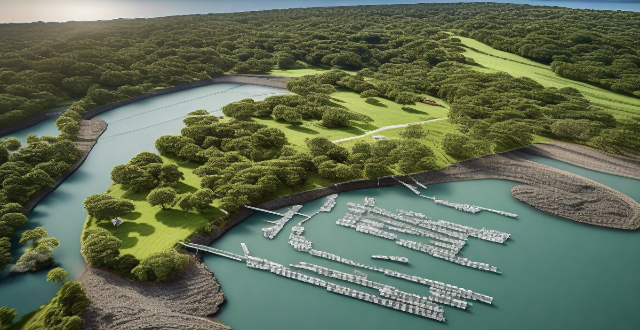Climate change has already caused significant losses and damages, including extreme weather events, rising sea levels, and changes in precipitation patterns. To adapt to these impacts, we need to take proactive measures at individual, community, and governmental levels. Some strategies for adapting to the losses and damages caused by climate change include understanding the risks, strengthening infrastructure, promoting sustainable practices, building community resilience, encouraging innovation and research, supporting policy initiatives, fostering international cooperation, investing in natural solutions, preparing for long-term changes, and integrating adaptation into development goals. By implementing these strategies, we can build a more resilient society capable of adapting to the losses and damages caused by climate change.

Adapting to Losses and Damages Caused by Climate Change
Climate change is a global issue that affects every aspect of life, from the environment to the economy. It has already caused significant losses and damages, including extreme weather events, rising sea levels, and changes in precipitation patterns. To adapt to these impacts, we need to take proactive measures at individual, community, and governmental levels. Here are some strategies for adapting to the losses and damages caused by climate change:
1. Understand the Risks
- Educate Yourself: Learn about the potential impacts of climate change in your area, such as floods, droughts, or heatwaves.
- Assess Vulnerabilities: Identify which systems or sectors are most vulnerable to climate change impacts.
2. Strengthen Infrastructure
- Improve Resilience: Reinforce buildings, roads, bridges, and other infrastructure to withstand extreme weather events.
- Water Management: Develop efficient water management systems to cope with changing precipitation patterns and reduce flood risks.
3. Promote Sustainable Practices
- Reduce Emissions: Adopt clean energy sources and energy-efficient technologies to lower greenhouse gas emissions.
- Sustainable Agriculture: Use sustainable farming practices that can adapt to changing climate conditions.
4. Build Community Resilience
- Emergency Plans: Create emergency response plans for different climate-related scenarios.
- Community Awareness: Raise awareness about climate change risks and adaptation strategies among community members.
5. Encourage Innovation and Research
- Technological Advances: Support research and development of new technologies that can help adapt to climate change.
- Data Collection: Gather data on climate impacts to inform decision-making and improve adaptation strategies over time.
6. Support Policy Initiatives
- Advocate for Policies: Support policies that promote adaptation to climate change, such as building codes and land use planning.
- Funding for Adaptation: Lobby for funding opportunities that assist communities in adapting to climate change impacts.
7. Foster International Cooperation
- Sharing Knowledge: Collaborate with other countries to share knowledge and best practices on climate change adaptation.
- Global Initiatives: Participate in international agreements aimed at addressing climate change, like the Paris Agreement.
8. Invest in Natural Solutions
- Coastal Ecosystems: Restore and protect coastal ecosystems like mangroves and coral reefs that provide natural buffers against sea level rise.
- Reforestation: Plant trees and restore forests to absorb carbon dioxide from the atmosphere and enhance biodiversity.
9. Prepare for Long-Term Changes
- Future-Proofing: When designing new projects or infrastructure, consider long-term climate projections to ensure they remain functional under changing conditions.
- Flexible Strategies: Develop flexible adaptation strategies that can be adjusted as climate conditions evolve.
10. Integrate Adaptation into Development Goals
- Inclusive Development: Make sure that adaptation efforts also address social equity and do not leave behind vulnerable populations.
- Mainstreaming: Mainstream climate change adaptation into broader development agendas to ensure coherent and comprehensive action.
By implementing these strategies, we can build a more resilient society capable of adapting to the losses and damages caused by climate change. It requires concerted efforts from individuals, communities, governments, and international bodies to mitigate the effects of climate change and prepare for an uncertain future.